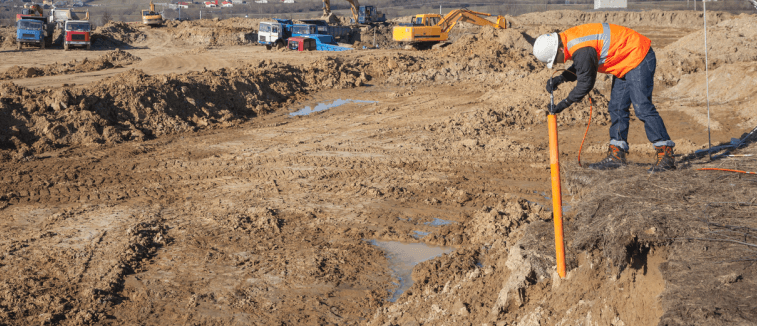The Best Guide To Geotheta
The Best Guide To Geotheta
Blog Article
Geotheta Things To Know Before You Get This
Table of ContentsGetting My Geotheta To WorkThe 6-Minute Rule for GeothetaGeotheta - TruthsThe Of GeothetaNot known Facts About Geotheta

They carry out website investigations, gather samples, perform research laboratory examinations, and evaluate information to review the suitability of the ground for building and construction projects - Consulting Engineers. Based on their searchings for, geotechnical designers provide referrals for foundation layout, slope security, keeping frameworks, and mitigation of geotechnical dangers. They work together with various other specialists, such as engineers, structural designers, and building teams, to ensure that geotechnical considerations are incorporated into the overall job layout and implementation
By evaluating the actions and homes of dirt and rock, they can recognize potential geotechnical threats such as landslides, soil negotiation, or incline instability. Their competence assists prevent failings or accidents that could jeopardize lives and residential property. Below are some comprehensive duties and duties of a geotechnical engineer: Website Examination: Geotechnical engineers conduct website examinations to collect data on subsurface problems.
They interpret the data to recognize the residential or commercial properties and behavior of the soil and rock, including their stamina, leaks in the structure, compaction attributes, and groundwater problems. Geotechnical Evaluation and Style: Geotechnical engineers evaluate the data accumulated throughout website examinations to analyze the security and suitability of the site for building tasks. They perform geotechnical calculations and modeling to assess aspects such as bearing capability, negotiation, slope stability, side earth pressures, and groundwater flow.
The Definitive Guide for Geotheta
Foundation Design: Geotechnical designers play a crucial function in creating structures that can securely sustain the designated structure. They analyze the dirt conditions and load demands to figure out the ideal structure kind, such as superficial structures (e.g., grounds), deep structures (e.g (https://ameblo.jp/geotheta/entry-12862281966.html)., piles), or specialized techniques like dirt enhancement. They consider elements such as settlement limits, bearing ability, and soil-structure communication to establish optimum foundation designs
They evaluate building and construction plans, monitor site activities, and carry out area examinations to confirm that the design recommendations are adhered to. If unpredicted geotechnical issues occur, they analyze the circumstance and offer recommendations for remediation or modifications to the style. Risk Evaluation and Mitigation: Geotechnical designers assess geotechnical hazards and risks connected with the job site, such as landslides, liquefaction, or dirt disintegration.

Collaboration and Interaction: Geotechnical engineers work closely with other experts associated with a task, such as engineers, structural engineers, and building and construction groups. Efficient interaction and cooperation are vital to incorporate geotechnical factors to consider into the overall job style and building procedure. Geotechnical engineers provide technical knowledge, answer inquiries, and make certain that geotechnical requirements are met.
All About Geotheta
Below are some sorts of geotechnical engineers: Structure Engineer: Structure designers specialize in creating and analyzing structures for structures. They analyze the soil conditions, load demands, and site characteristics to establish the most appropriate structure type and style, such as superficial structures, deep structures, or specialized techniques like stack structures.
They assess the variables influencing incline security, such as soil residential properties, groundwater conditions, and slope geometry, and develop techniques to stop slope failings and alleviate risks. Earthquake Designer: Earthquake engineers focus on analyzing and developing structures to hold up against seismic pressures. They examine the seismic risk of a website, review soil liquefaction potential, and create seismic style standards to guarantee the safety and durability of frameworks throughout quakes.
They carry out area testing, collect examples, and assess the collected information to identify the soil homes, geologic formations, and groundwater problems at a website. Geotechnical Instrumentation Designer: Geotechnical instrumentation engineers focus on surveillance and determining the habits of soil, rock, and frameworks. They set up and keep instrumentation systems that keep an eye on elements such as dirt settlement, groundwater levels, incline movements, and architectural displacements to assess efficiency and supply very early warnings of possible concerns.
What Does Geotheta Mean?
They conduct examinations such as triaxial tests, consolidation examinations, direct shear tests, and permeability tests to collect data for geotechnical evaluation and design. Geosynthetics Engineer: Geosynthetics designers concentrate on the style and application of geosynthetic materials, such as geotextiles, geogrids, and geomembranes. They utilize these materials to improve soil stability, strengthen slopes, give water drainage options, and control erosion.
They have a tendency to be site here investigative individuals, which indicates they're intellectual, reflective, and analytical. They are curious, systematic, reasonable, analytical, and logical. Some of them are additionally social, implying they're kind, charitable, cooperative, individual, caring, helpful, compassionate, skillful, and friendly - Geo Tech Engineer.
In the office environment, geotechnical engineers utilize specialized software application tools to execute calculations, produce styles, and assess information. They prepare reports, review task specs, connect with customers and employee, and coordinate task activities. The workplace setup offers a helpful environment for research, evaluation, and partnership with other experts involved in the task.
Not known Incorrect Statements About Geotheta
They regularly check out task sites to conduct website examinations, evaluate geotechnical conditions, and gather data for evaluation. These visits include traveling to different locations, often in remote or challenging terrains. Geotechnical engineers may execute dirt tasting, conduct examinations, and monitor building and construction activities to make sure that the geotechnical elements of the project are being executed appropriately.
Geotechnical designers additionally function in specialized geotechnical labs. In these facilities, they conduct experiments, do examinations on soil and rock samples, and evaluate the design homes of the products. Geotechnical laboratory designers function extensively in these settings, handling testing tools, operating tools, and taping data. They team up with various other research laboratory staff to make certain accurate and trustworthy testing outcomes.
Report this page